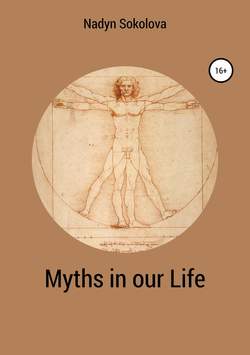Myths in our Life

Реклама. ООО «ЛитРес», ИНН: 7719571260.
Отрывок из книги
People have always longed to perceive nature, have endevoured to explain for themselves world that surrounded them and to recognize their place in it. The primitive viewed everything as novelty. Trying to understand eternal principles, mankind began to create myths. This process has been continuing even till this day.
The word "myth" inevitably evokes associations with antique sagas about gods and heroes. Herewith it is believed that a myth belongs to the past and is not available to exist in the present. To seize the essence of this conception we shall examine the statements about a myth given in the scientific literature. In the most general aspect myth is considered as "the way of the human being and attitude, entirely based on the notional linkage of a person and the world; the person perceives here psychological meanings by the way of the elementary features of the material, and regards and considers natural phenomena as animated creatures" [Cultural Study 2001: 100]. In this definition myth is viewed as psychologically-culturological category, determining relationship of the human conscience to the world that surrounds it, at that this relationship is characterized in myth with convergence vector up to complete identification. It is specified further that such a perception of the unity of oneself with the world, such a personification of reality is not confined by temporary framework by early cultural epochs, since myth is eternal: "for mythological mensuration assists in each culture and mythological images and experiences are rooted in unconscious elements of the human soul (compare Jung"s conception of archetyps – N. Sh.)" [Ibid.]. Therefore there is no surprise that myth is present even in modern reality, affecting the unconscious of individuals and aiding the mythologization of their conscience.
.....
It should be mentioned that this scientist regarded myth from the psycholinguistic point of view. He presumed that "mythical world view is determined purely by psychical processes (fable-thought), mythology is created by linguistic factors" [Ibid., 267]. He specified: "The creation of a new myth consists of the creation of a new world, not in the oblivion of the preceding meaning" [Ibid., 266]. Potebnya"s opinion is important for us because his thought that the process of the world mythologization is connected with language, with word which reflects the fact of the humanization of nature, in particular, in the anthropological metaphors. Dalj in his "The Explanatory Dictionary" gave the following interpretation for the word "myth": "a fabulous, all-time, fabled event or person; an allegory acted out, that came into legends" [Dalj 1994, V. 3: 862]. Here is marked one more – folklore – form of myth"s fixing. Creative nature of myth, development of the verbal image in it and the main reason of myths" appearance, their role in development of game culture – everything this is examined in the research of J. Huizinga "Homo Ludens, or The Playing Man". This author considers myth to be "an imaginative materialization of entity…, elaborated more particularly than a single word. With the help of myth people try to explain earthly, placing the basis of human deeds in the sphere of divine… In myth great motive powers of cultural life begin: law and order, communication and enterprise, craft and art, poetry, scholarship, science" [Huizinga 1997: 24, 121]. Developing such interpretation of myth "Mythological Dictionary" concretizes and enumerates images, personified in myth: "Myths are the sagas of gods, spirits, heroes deified or connected with gods by their birth, ancestors, who functioned at the beginning of time and participated, directly or indirectly, in creation of the world, its element, both natural and cultural" [Mythological Dictionary 1990: 634].
In a brief definition of a dictionary of aesthetics myth, as special form of social conscience, is ascribed to the early phases of the human development. Myth is defined here as "specific for primitive conscience syncretic reflection of the reality in the form of perceptibly concrete personifications and animated beings, which think quite materially…, the product of verbal folk arts, collective folk imagination" [Aesthetics 1989: 206].
.....